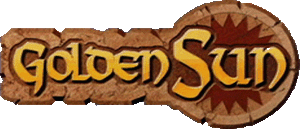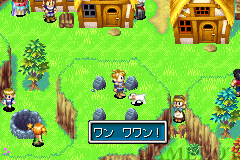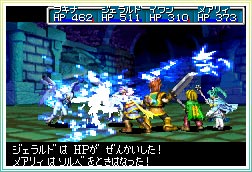|
|

|
PLATFORM
|
GBA
|
BATTLE SYSTEM
|

|
INTERACTION
|

|
ORIGINALITY
|

|
STORY
|

|
MUSIC & SOUND
|

|
VISUALS
|

|
CHALLENGE
|
Easy
|
COMPLETION TIME
|
20-40 Hours
|
|
OVERALL

|
+ Amazing level design.
+ Djinni and summon systems provide interesting game balance.
+ Every aspect of the game is solid.
- Vital Djinni can easily be missed.
- Normal encounters can get dull.
|
Click here for scoring definitions
|
|
|
It's been cloudy for six years now, but at E3 2009, the Sun finally broke through the vapor and shone brightly once again. The long-awaited Golden Sun DS was finally announced. What did such a spectacular announcement bring with it? An intense and unyielding urge to play through the game that started it all, Golden Sun. Released back in 2001 for the Game Boy Advance, Golden Sun is a traditional RPG that easily surpasses others of its ilk thanks to terrific level design and quick, enjoyable gameplay. Even eight years after the fact, it stands out as a truly marvelous game that is destined to become legendary, standing side by side with the likes of Earthbound or Chrono Trigger in fans' hearts.
Golden Sun is the first part of a story that continues with 2003's Golden Sun: The Lost Age, and follows the journey of Isaac and Garet. In the world of Weyard, a dangerous, ancient force known as alchemy has remained sealed away for generations. Isaac and Garet are adepts, able to harness elemental powers known as psynergy to perform incredible feats. Their village is tasked with guarding the Sol Sanctum, an ancient ruin that holds the keys to restoring alchemy to the world. When a strange pair of thieves, aided by a childhood friend long thought dead, steal those keys and kidnap two of their close friends, Isaac and Garet set out on a journey to stop them from lighting the four elemental lighthouses and thus preventing the resurrection of alchemy.
The plot is actually incredibly detailed and interesting, but unfortunately it's also fairly limited in scope. As a result, much of the game is spent performing tasks that don't have much of a bearing on the main story. Saving cursed villages, catching thieves, and studying with martial arts gurus are only a few of the adventures Isaac's company will be partaking in during the course of the game. Luckily, these side tasks are used as an excuse to flesh out the world of Weyard and explain some of the mysteries of psynergy. The characters are charming and all have impressive backstories that slowly reveal themselves as the game progresses, keeping the story interesting and enjoyable between major plot segments.
One of the more interesting aspects of the story is the fact that the player's role is reversed from the typical RPG. Rather than actively attempting to accomplish something as per most RPGs, you're trying to stop the villains who are always one step ahead. Likewise, it's also one of the only RPGs in which the protagonists regularly fail at their objectives — but then, it wouldn't be much of a game if the bad guys were stopped at the first lighthouse. Since it's the first part of a larger story, the game naturally doesn't conclude completely, but nonetheless, Golden Sun manages to satisfactorily finish the first part of the story in a way that builds anticipation for the rest, but doesn't feel like a tease the way most cliffhangers do.
 Even towns have puzzles for you to solve.
Even towns have puzzles for you to solve.
|
|
Golden Sun real claim to fame lies in the gameplay, but not the battle system in particular. Combat is handled in a fairly traditional way; each character chooses an attack for the round and then both the allied and enemy parties duke it out with agility determining turn order. Normal encounters can generally be conquered with nothing but normal attacks and occasionally a healing spell, but thankfully the encounter rate isn't terribly high and battles themselves proceed very quickly. Boss fights are another story, and generally require pulling out all the stops. This is where the more complex aspects of the combat come into play: the Djinni.
Djinni are an odd aspect of the game that are far and away the most important part of party development. These strange creatures come in four elemental varieties and can be found and captured from various areas throughout the game. There are thirty-two to find in total, and it can be easy to accidentally miss some of them. Some are hidden, some are in out-of-the-way, seemingly meaningless areas on the world map, and others are in plain sight but cut off by a puzzle. Once captured, the djinni provide pretty much all of the more advanced features of combat.
To start things off, each Djinni can be either set to a character, or put on standby. While set, the Djinni provides stat bonuses for the character. Depending on the elements and quantity of the Djinni that are set, the character's class and psynergy abilities may change as well. While in battle, a Djinni can be unleashed, providing some sort of effect that is unique to each of the thirty-two in the game. After being unleashed, the Djinni end up in standby mode.
Once in standby mode, Djinni can be used to conjure powerful summons. The more Djinni on standby, the more powerful the summon that can be unleashed. After summoning, the Djinni enter a recharge mode, and at the end of each turn, each character automatically changes one of them to set mode. The result of this is a rather interesting balancing act that makes boss fights very enjoyable. On the one hand, making use of the powerful summons to end a battle faster seems like a good idea, but doing so also weakens the party members, reducing their available psynergy and making them vulnerable to attack.
 Battle visuals are quite impressive.
Battle visuals are quite impressive.
|
|
Messing around with Djinni assignments and the classes that result can be a lot of fun, but in general, the battle system is adequate, but not really particularly impressive. It serves its purpose, but isn't much more than average. The true joy of Golden Sun lies in its level design; specifically, its puzzles. Golden Sun is filled to the brim with complex, fun-to-solve puzzles. As the game progresses, the characters learn new, specialized psynergy techniques that are used to solve these puzzles and progress through the various dungeons.
Golden Sun maintains its splendor in the visuals department as well. With gorgeous, easily recognizable sprites, detailed environments, and an isometric world map that is almost 3D, the game looks fantastic. The graphics are some of the best the Game Boy Advance produced. One of the subtler features is the use of small, word bubble emoticons used to represent facial expressions where the sprites themselves aren't capable of doing so. Although it's a very simple effect, it adds a lot more depth to the dialogue than text alone can provide. Even more impressive are the battle graphics, which feature more detailed character and enemy sprites, impressive spell animations, and even simulated 3D camera movement.
Similarly, Motoi Sakuraba's work on the soundtrack is absolutely superb. This is surprising, considering the composer's work is often criticized for being derivative, mediocre, and sometimes even inappropriate to the game it's composed for. Luckily, Golden Sun's soundtrack is nothing like any other composition he has produced; in fact, had I not looked it up, I would never have guessed he was the man behind it, it's so uncharacteristic.
What makes Golden Sun such a great game isn't any one aspect, but rather the fact that it's a complete package. Solid combat, terrific level design, an enjoyable story, attractive visuals, and a catchy soundtrack; each contribute something to the overall experience, and the result is a game that is hard to put down. This first installment lasts roughly twenty to thirty hours, and shouldn't pose too much challenge for most RPGamers, though some of the puzzles might make you scratch your noodle. Golden Sun is one of the brighter stars available on the Game Boy Advance, and is a game everyone should try to experience.
Review Archives
|









